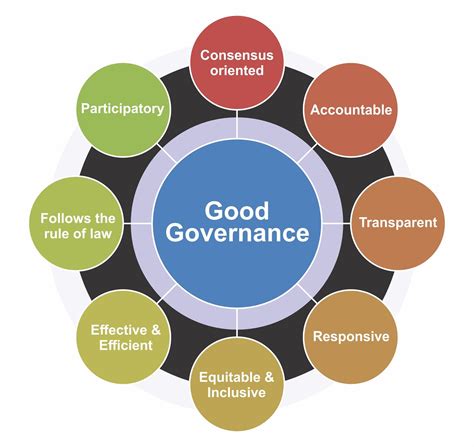Transparency and Accountability in Government: Best Practices

Learn about the importance of transparency in government, implementing open data initiatives, benefits of public participation, whistleblower protection, and measuring the impact of accountability measures.In today’s rapidly changing world, the need for transparency and accountability in government has never been more crucial. As citizens, it is essential for us to be informed about the decisions made by our elected officials and the inner workings of our government. This blog post will delve into the significance of transparency in government, the implementation of open data initiatives, the benefits of public participation, the development of effective whistleblower protection, and the measurement of the impact of accountability measures. By understanding these key components, we can strive for a more open and responsible government that serves the best interests of its citizens. Join us as we explore the best practices for achieving transparency and accountability in government, and how they can lead to a more informed and engaged society.
Importance of transparency in government
Transparency in government is crucial for maintaining trust and accountability among the public. When citizens have access to information about the decisions and actions of their government, they are better equipped to hold their representatives accountable. Transparency fosters an environment of openness and honesty, helping to build public confidence in the government’s processes and decision-making.
Furthermore, transparency in government plays a significant role in combating corruption. When government operations are shrouded in secrecy, opportunities for misconduct and unethical behavior are more likely to arise. By implementing open data initiatives and making information readily available to the public, the government can reduce the risk of corruption and promote a culture of integrity and ethical conduct.
Lastly, transparency in government is essential for ensuring the effectiveness of programs and policies. When citizens can access information about how their tax dollars are being spent, they are better able to assess the impact of government initiatives and provide feedback. This public participation can ultimately lead to more informed decision-making and improved outcomes for the community as a whole.
Implementing open data initiatives
Implementing open data initiatives can make a significant impact on the efficiency and transparency of government operations. By making government data openly accessible to the public, it creates opportunities for innovation, collaboration, and accountability. This approach can also improve decision-making and public service delivery by providing valuable insights and information to citizens and businesses.
One of the benefits of implementing open data initiatives is that it fosters a culture of transparency and trust between the government and its citizens. When government data is freely available, it allows citizens to monitor and analyze government activities, ultimately leading to increased accountability and integrity in public institutions.
Furthermore, open data initiatives can spur economic growth and development by enabling the creation of new products, services, and opportunities. When entrepreneurs, researchers, and developers have access to government data, it can lead to the creation of innovative solutions that address societal challenges and improve the overall quality of life for citizens.
Benefits of public participation
Public participation in government decision-making processes is essential for creating a more inclusive and transparent society. When members of the public are given the opportunity to provide input and feedback on policies and initiatives, it not only fosters a sense of community and belonging, but also leads to better informed and more comprehensive governance. By allowing citizens to voice their opinions and concerns, governments can gain valuable insights and perspectives that may have been overlooked otherwise.
Furthermore, public participation promotes accountability and trust in government. When individuals feel that their voices are being heard and their opinions are valued, they are more likely to trust in the integrity of government institutions. This ultimately leads to a stronger sense of civic duty and engagement among the public, resulting in a more cohesive and harmonious society.
Additionally, public participation can lead to more effective and well-rounded policies. By incorporating the input of diverse stakeholders, decision-makers can ensure that the needs and concerns of all segments of society are taken into consideration. This can result in more equitable and sustainable policies that truly reflect the best interests of the public as a whole.
Developing effective whistleblower protection
Whistleblowers play a crucial role in bringing to light the wrongdoing and misconduct of individuals and organizations, especially within the government sector. It is essential to establish effective protection mechanisms for these individuals to encourage the disclosure of information without fear of retaliation or persecution.
Developing effective whistleblower protection involves enacting comprehensive laws and policies that not only safeguard the identity of the whistleblower but also provide legal remedies in case of any reprisals. This includes creating channels for the confidential reporting of misconduct, ensuring the anonymity of whistleblowers, and offering legal support and protection against any form of retaliation.
Furthermore, it is important to establish an independent oversight body to review and investigate whistleblower disclosures, ensuring that the information provided is thoroughly examined and appropriate action is taken against any wrongdoings. This provides reassurance to potential whistleblowers that their concerns will be taken seriously and acted upon.
Measuring the impact of accountability measures
Accountability measures are an essential aspect of any government or organization, as they are designed to ensure that individuals are held responsible for their actions and decisions. By measuring the impact of these accountability measures, we can gain valuable insights into their effectiveness and identify areas for improvement. One common approach to measuring the impact of accountability measures is through the use of performance metrics and key performance indicators (KPIs). These KPIs can help to quantify the success of accountability initiatives and provide a clear picture of their impact on organizational behavior and decision-making processes.
Another important method for measuring the impact of accountability measures is through the use of surveys and feedback mechanisms. By gathering feedback from employees, stakeholders, and the general public, government entities can gain valuable insight into how accountability measures are perceived and identify any potential areas for improvement. Additionally, this feedback can help to identify any unintended consequences or negative impacts of accountability measures, allowing for adjustments to be made as necessary.
Finally, one of the most effective ways to measure the impact of accountability measures is through the analysis of case studies and real-world examples. By examining specific instances where accountability measures were put into action, government entities can gain valuable insight into their effectiveness and how they have contributed to positive outcomes. These case studies can also help to identify any potential areas for improvement and serve as a valuable learning tool for future accountability initiatives.





